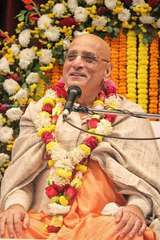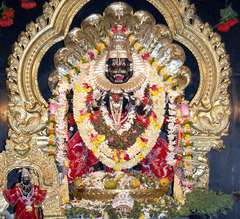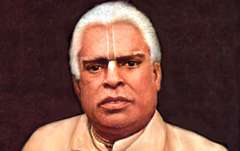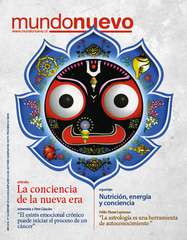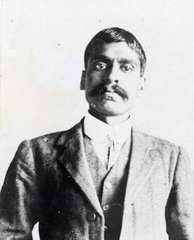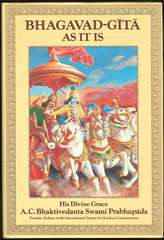Hare Krishna Maharaja!
AGTSP AGTHPS PAMHO
(June 20 Saturday 2020)
In response to our previous communication (https://monkeywarrior.com/detail/11242/) I'm so glad to know that allergy is under control and you are with good energy, I can note it listening your online programs. Related with this, thank you very much for your answer this morning, I said to you that I think the economy is the heart of society and not the education, but after your reply I understood that this modern society is, then, a deformed body. So, is Education (or must to be) the heart of every activity in a healthy and harmonic society?
ASA - AGTSP!!! What is education? Acquire information? Learn to reason about our information? Wake up our relationship with Krsna!!! The heart of every society is congregational chanting of the glories of the Lord.
I talked with Rodrigo's mother a few minutes ago and told her that you asked to me about them. She still sad missing her son. They are afraid about the virus, the Kiosko sells less, but they still working with protections. She said "please, tell Hare Krishna to the Guru and thanks so much to Him".
ASA - Same to her!
Thank you very much, thank you so much, for every single reply you wrote to me in the previous letter, I felt (and I feel because I read it again any time I need inspiration) my heart melts. I don't know how to explain it, because I don't know the proper way to share so intimate feelings, but my chest is into a warm and expansive feeling, with a certainty deep thought that is just because of your mercy.
ASA - Maybe is symptom of a new pandemic disease!
A few hours ago, Iván Santandreu left the body. He is the owner and founder of "Mundo Nuevo" Magazine, one of the most important alternative media in Chile, probably the main one. He was 58 years old. I don't know the circumstances at all. He is a great soul. This last years he was fighting, fighting really hard, using scientific bases and medical references from all over the world through his mass medias against vaccines, transgenics, pharmacy and alimentary industry, corruption... He has got 22 years of successful trajectory and his influence is growing day by day here in Chile, at least 1 million monthly followers, readers and users. He was a real master in his area. His wife is an Iskcon devotee and so are their children, but they all walked away after rape and corruption cases were uncovered.
ASA - In ISKCON???? I know that some devotees had made formal complaints to the GBC. Formed a committee, but it was hard to help them completely because of the language barrier, and they stopped moving forward through the institutional system. I told them to go on and write to me in simple, clear English and I will help what I can.
In the KDh we were posting results of our suggestions to GBC about reorganizing management in CHile. After three months (who can work faster!) GBC said that they were making changes in the structure. Vice President learning to become President. President moving to Zonal Supervisor.
Did that happen?
A few years ago I found him playing Karatalas in some kirtans in the temple, but he always kept low profile, he didn't like to let other devotees to know who he was. He helped us in 2018 with " The Art and The Sacred", we published in his magazine your interview we made in chilean government palace and we bought in a low price a quarter of page into the paper magazine promoting the day with you and Dr. File. He was very nice with us even I asked for all those things to him just upon the deadline to enter to the printing. Last year he published Lord Jagannath in the cover page of the magazine! I think he comes back to the Spiritual World... My Eternal Lord, Krishna, please, take him come back Home...
ASA - Preacher or anyone who helps the preacher will find the path of spiritual life open!
https://www.mundonuevo.cl/el-arte-y-lo-sagrado-cultivando-el-espiritu-humano/
Since the last day of the Iskcon Education International Seminary, I keeped fascinated with extracts from a mystical Bhaktivinoda Thakur's poetry that an older devotee shared in his exposition. So, I search it on the web and I found an english version, but I don't know if is the original one, I mean, I don't know if Bhaktivinoda Thakur wrote it in english or bengalí. And I found a spanish version, but I really didn't like at all, so I decided to write a translation by my own. It tooks me all this week and I already finished just before to start writing this letter. I want to offer this translation to you, Maharaja, in this day that is special for all of us, Bhaktivinoda Thakura appearance day. Please, Maharaja, accept this offering as a humble effort from a dumb fallen one who is trying to do things right just to be your servant some day. I tried to connect with the original feeling of the poetry and also try to keep the rhymes in spanish, but I could not accomplish it at all. Of course, is not necessary you read the spanish version, is so long, but I send it at the end of this letter anyway. It is such a pretty wonderful and beautiful poetry.
ASA - Yes! Was Engish. Very, very, nice poem. I memorized once. Still know parts of it.
https://www.iskcontimes.com/saragrahi-vaishnava-by-bhaktivinode-thakur/
I just don't know how to express the gratitude that I deeply feel towards you... all glories to Srila Prabhupada! all glories to Bhaktivinoda Thakura!
Your aspiring servant,
Carlos.
HpS - Save copy of the poem. Maybe work on the translation more. You can also write another poem in Spanish based upon the ideas.
Saragrahi Vaishnava – por Bhaktivinoda Thakur
1. ¡Ay de aquellos que pasan sus días
En alegría festiva y alborozo!
Las deslumbrantes formas líquidas mortales
Ocupan para siempre sus corazones.
2. Las botellas que brillan hechizan el mirar
De aquellos a quienes atrae y abrazan del corazón;
Los esclavos del vino nunca se pueden levantar
De lo que nosotros llamamos desgracia y deshonor.
3. ¿Estaba el hombre destinado a ser
Un bruto en su actuar y en su corazón?
¿Debería el hombre, que señor de todo lo que le rodea es,
Apartarse del sentido común?
4. La gloria del hombre es, en sentido común,
Dictarnos la gracia,
El hombre está hecho para vivir y amar
El hermoso abrazo del Cielo.
5. La carne es nuestra desgracia,
El marco mortal que encadena;
El alma por antiguos errores confinada
Debe intentar levantarse de nuevo.
6. ¿Por qué entonces este juego infantil
En lo que no puede ser nuestro,
Que cae dentro de cien años
Como si una rosa se hubiera volado?
7. Nuestra vida no es más que un rosado matiz
Ir antes de tiempo por nada;
El alma sola estaría por siempre
Con el bien o el mal a cuestas.
8. ¡Cuán profundo es el pensamiento de los tiempos!
¡Qué grave se ve su aspecto!
Y envueltos en asombro divino, oh, nosotros,
Los libros de la Naturaleza leyendo.
9. La vida del hombre un problema oscuro es para él,
Una cortina a la izquierda y a la derecha;
Ninguna alma ha venido a decirnos
Qué existe más allá de nuestra vista.
10. Y entonces una voz, tan suave y profunda,
Dentro de nuestro propio interior es sentida;
¡Hombre! ¡Hombre! ¡Eres un alma inmortal!
La muerte nunca te puede disolver.
11. Para ti, tu Señor en lo alto ha mantenido
Una reserva de felicidad, allá arriba,
Hasta el fin de los tiempos, ¡tú eres Oh!
El que quiere más puro amor.
¡Oh amor! Tu poder y hechizo benignos
Ahora derriten mi alma ante Dios;
¿Cómo pueden mis palabras terrenales describir
Tan suave y expansivo sentimiento?
12. Disfrute, tristeza,
¿Qué más de lo que la carne es heredera?
El alma que duerme
Solo concluye que de ellos participa.
13. Y entonces, amigos míos, no más disfrute
Ni lamentarse por todos los demás;
Las mujeres, el vino y la carne de las bestias,
No hay amor alguno que esto otorgue.
14. Lo tuyo es amar a tu hermano
Y entregarte a Dios.
Y Dios sabe que tu esfuerzo es bueno
Este hecho es cierto y claro.
15. Olvida el pasado que duerme
y con el futuro no sueñes jamás.
Actúa siempre en el tiempo en el que estás
y el avance llamarás.
16. Pero no me digas en un frío razonamiento
Que el alma es creada solo
Por las inertes reglas mecánicas de la Tierra
Y que será destruida.
17. Solo mi Dios que nos dio la vida y todo
El alma puede extinguir,
O darle todos los placeres elevados
Para Su promesa cumplir.
18. Así que empuja tu marcha hacia adelante, oh alma,
Contra todo acto malvado
Que se levante con los soldados Odio y Lujuria;
Sé un héroe de verdad.
19. Mantén tu posición en el mundo espiritual
Tan firmemente como puedas,
Nunca dejes que la materia te empuje
¡Oh, aguanta hombre heroico!
20. Oh alma del Śaragrāhi Vaiṣṇava,
Tú eres un ángel hermoso;
Guía, guíame a Vrindavan
Y el poder del espíritu anuncia.
21. Allí, libre de la materia descansa mi alma
Sobre los brazos de mi amante.
Paz eterna y amor espiritual
Son la magia de mi cantar.

